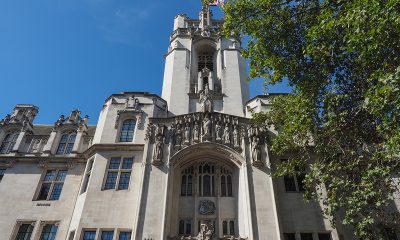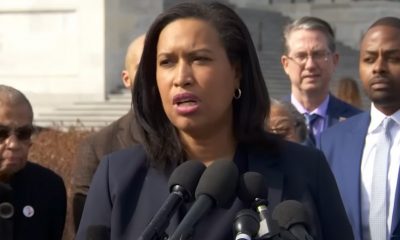Local
Hundreds march against anti-LGBT violence
D.C. police chief, four Council members join demonstration
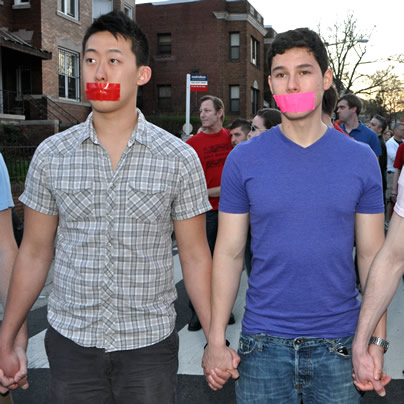
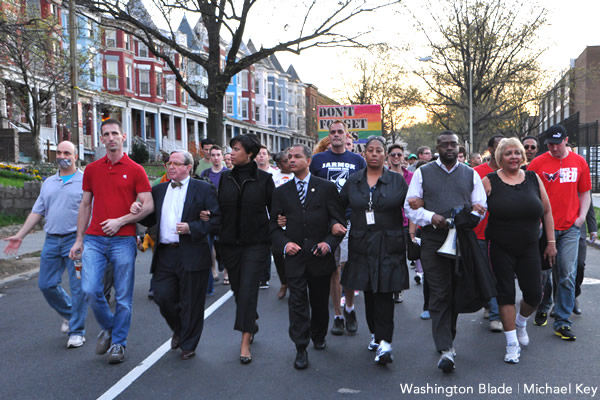
Mayor's Office LGBT liaison Jeffrey Richardson, and council members Muriel Bowser and Jim Graham join D.C. residents in calling for an end to anti-LGBT violence. (Washington Blade photo by Michael Key)
As many as 700 people turned out for a march through the streets of Washington, D.C., Tuesday night to take a stand against anti-LGBT violence following separate attacks against two gay men and a transgender woman during a two-day period earlier this month.
Friends of one of the two gay male victims, who organized the march, said they were astonished over the outpouring of support that emerged from the LGBT community and city officials, including D.C. Police Chief Cathy Lanier and four members of the City Council.
“It was a Facebook event and I expected maybe 15 to 50 people to show up,” said Patrick Pressman, one of the lead organizers. “And then from there it just exploded,” he said. “It got to where it was today, when it was estimated that about 700 people were going to attend.”
Pressman said he is a friend of a 29-year-old gay man who was robbed and badly beaten on March 12 by assailants who called him anti-gay names at Georgia Avenue and Irving Street, N.W.
The march started outside the International House of Pancakes restaurant at 14th and Irving streets, N.W., in Columbia Heights, where a 31-year-old gay man was shot about 6 a.m. Sunday, March 11, in what police say was an altercation with two men who called him anti-gay names.
Lanier, who spoke to the marchers as they gathered outside the IHOP restaurant, said she expects an arrest in the case soon, saying she is “very pleased” with the progress of the investigation.
“We have everybody working on this and I think everybody’s committed,” she said. “We kind of take it personally when people in our community are targeted.”
SEE DOZENS OF PICTURES FROM THE MARCH IN THE WASHINGTON BLADE PHOTO GALLERY HERE.
Police said the victim of the IHOP shooting was fortunate to have received a non-life threatening gunshot wound. His cousin, who was with him at the time of the shooting, said the victim was expected to be released from the hospital this week after being treated for a punctured liver.
Gay D.C. Council member Jim Graham (D-Ward 1), who participated in the march, said he was especially concerned that two of the incidents took place in his ward. He said the large showing of support for the march demonstrates that the community is outraged over anti-LGBT violence.
From the IHOP, the march traveled east on Irving Street to Georgia Avenue, the site where the 29-year-old gay man was attacked and beaten about 9:30 p.m. on March 12.
Police said the transgender woman was attacked and knocked unconscious about 11:45 that same night at the intersection of West Virginia Avenue and Mt. Olivet Road, N.E. People who know the victim said she reported later that she was not robbed and thought the attack was motivated by anti-transgender bias.
But police say, unlike the other two incidents, they have not listed the case as a hate crime because they don’t have sufficient evidence for such a classification. Assistant D.C. Police Chief Peter Newsham told a meeting of the Gertrude Stein Democratic Club Monday night that investigators were looking for witnesses who might have heard whether the attackers hurled anti-trans names at the victim.
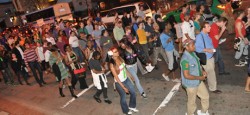
Hundreds of marchers joined the hastily assembled march organized after a recent spate of anti-gay violence in the nation's capital. (Washington Blade photo by Michael Key)
Newsham said investigators believe the three incidents were unrelated, with the attacks carried out by different groups of perpetrators.
The march paused when it reached the site where the 29-year-old gay man was attacked at Georgia Avenue and Irving Street.
“I want to say that this walk should never have to happen again in our city,” said D.C. Council Chair Kwame Brown (D-At-Large). “We have to do more. We must do more,” he said. “And for those who know about this horrific situation that took place, I’m begging you to come forth. Give us information … to bring these folks to justice.”
Brown was referring to reports by police that many people were on the street in the vicinity of the attack at the time it occurred.
Council members Michael Brown (D-At-large) and Muriel Bowser (D-Ward 4) also participated in the march, saying they were in solidarity with the LGBT community in seeking ways to curtail hate violence against all city residents.
Also participating in the march was Jeffrey Richardson, director of Mayor Vincent Gray’s Office of LGBT Affairs, and Gustavo Velasquez, director of the D.C. Office of Human Rights. Richardson spoke at the gathering outside the IHOP restaurant.
Among those speaking at the Georgia Avenue and Irving Street site was A.J. Singletary, president of the D.C. group Gays and Lesbian Opposing Violence (GLOV). Singletary said he learned from the 29-year-old gay victim’s partner that the victim had been released from the hospital Tuesday, the day of the march.
“His jaw was shattered in two places,” said Singletary. “After two surgeries he now has permanent titanium plates holding his lower jaw together. In addition, his jaw is wired shut for the next four to six weeks.”
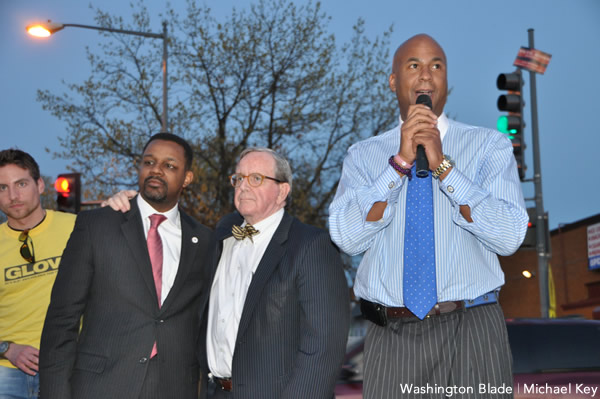
A.J. Singletary, Kwame Brown, Jim Graham, and Michael Brown at the rally. (Washington Blade photo by Michael Key)
The march continued south on Georgia Avenue to U Street, where it turned right and traveled to 14th Street. From there, with spectators looking on from the sidewalks, it traveled south on 14th to R Street, where it turned right and continued to its termination at 17th Street next to the gay bar Cobalt. Many of the marchers entered Cobalt, which hosted a fundraiser for the victim attacked at Georgia Avenue and Irving Street.
Gay Democratic activist Cartwright Moore, a member of the staff of D.C. Congressional Del. Eleanor Holmes Norton, said many of the march participants were young LGBT people who don’t ordinarily attend meetings of local LGBT organizations.
“It’s been great that the community has come together on an issue like this,” said D.C. resident Chris Shank, who said he learned about the march through a Facebook invitation.
“I marched the entire way,” he said. “I’m really glad it was organized. I think the response has been enormous.”
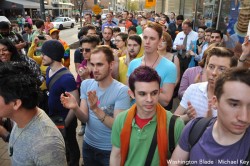
The event was largely organized through social networks like Facebook and Twitter, and the overwhelming number of young people in the crowd reflected these new media organizing tactics. (Washington Blade photo by Michael Key)
D.C. resident Phillip Pratt said he, too, learned of the event through Facebook. He said he became motivated to get involved after seeing that just a few days after organizers posted the event more than 500 people had committed to joining the march.
“I think it was very important to come out and march for this, to march with them and show our support,” he said.
Vic Suter said she wanted to take a stand against violence targeting her own community.
“Whether there be a thousand people marching down the street or five, it says that people are not going to tolerate such behavior and that we need to bring about tolerance and we need to teach the community that people are people regardless of who they love,” she said.
Asked if he thought the event would have an impact on the community, Singletary said he was hopeful that it would.
“We have a group of many hundreds walking down the middle of the street down major thoroughfares in D.C. where a lot of hate crimes have occurred,” he said while marching. “You’re talking about U Street, you’re talking about 14th Street. The street we’re on now is R. There have been a lot of attacks on this street itself. So the response by the community has been big and rightfully so.”
District of Columbia
Two charged with assaulting, robbing gay man at D.C. CVS store
Incident occurred after suspects, victim ‘exchanged words’ at bar

D.C. police just after 1 a.m. on April 10 arrested two men for allegedly assaulting and robbing a gay man inside a CVS store at 1418 P St., N.W., according to a police report and charging documents filed in D.C. Superior Court.
The charging documents state that the alleged assault and robbery occurred a short time after the three men “exchanged words” at the gay bar Number 9, which is located across the street from the CVS.
The arrested men are identified in the charging documents as Marquel Jose Diaz, 27, of Northwest D.C., and Lorenzo Jesse Scafidi, 21, of Elizabeth City, N.C. An affidavit in support of the arrest for Diaz says Diaz and the victim “were previously in a relationship for a year.”
Court records show Diaz was charged with Simple Assault, Theft Second Degree, and Possession of a Controlled Substance. The court records show the controlled substance charge was filed by police after Diaz was found to be in possession of a powdered substance that tested positive for cocaine.
Scafidi was charged with Simple Assault and Theft Second Degree, the court records show.
The D.C. police report for the incident does not list it as a suspected hate crime.
The court records show both men pleaded not guilty to the charges against them at a Superior Court arraignment on the day of their arrest on April 10. The records show they were released by a judge while awaiting trial with an order that they “stay away” from the victim. They are scheduled to return to court for a status hearing on May 21.
The separate police-filed affidavits in support of the arrests of both Diaz and Scafidi each state that the two men and the victim “exchanged words” inside the Number 9 bar. The two documents state that both men then entered the CVS store after the victim went to the store a short time earlier.
Scafidi “came into the CVS shortly after and entered the candy aisle and slammed Complainant 1 [the victim] to the ground causing Complainant 1’s phone to fall out of CP-1’s pocket,” one of the two affidavits says. It says Scafidi “again picked up CP-1 and slammed him to the ground.”
The affidavit in support of Diaz’s arrest says Diaz also followed the victim to the CVS store after words were exchanged at the bar. It says that after Scafidi allegedly knocked the victim down in the candy aisle Diaz picked up the victim’s phone, “swung on” the victim “while he was still on the ground,” and picked up the victim’s watch before he and Scafidi fled the scene.
Without saying why, the two arrest affidavits say Diaz and Scafidi returned to the scene and were arrested by police after the victim and at least one witness identified them as having assaulted and robbed the victim.
Attorneys representing the two arrested men did not respond to phone messages from the Washington Blade seeking comment and asking whether their clients dispute the allegations against them.
The victim also did not respond to attempts by the Blade to obtain a comment from him. The police report says the victim is a resident of Fairfax, Va.
District of Columbia
Bowser calls for ‘extraordinary’ response to reduction in D.C. budget
Impact on city funding for LGBTQ programs and grants unclear

D.C. Mayor Muriel Bowser on April 15 issued an executive order calling for “extraordinary actions,” including “significant cuts in District Government services,” to address a decision by Congress to cut the city’s current budget by $1.1 billion.
The nine-page executive order points out that these actions became necessary after the U.S. House of Representatives has so far declined to vote on a free-standing bill approved by the U.S. Senate last month that would restore the $1.1 billion D.C. budget cut initially approved by the House.
In addition to large-scale cuts in city services, the mayoral order says the congressionally imposed city budget cut will bring about city “hiring freezes, financial impacts to employees, reductions and terminations in contracts and grants, and closures of District Government facilities.”
The order adds, “These are unprecedented actions given that the District itself adopted and is able to implement a fully balanced budget, but they are necessary due to the Congressional cut to the District’s budget and its inaction in timely fixing its legislative error.”
The House adjourned this week on a recess until the end of April, and congressional observers say it is unclear whether the majority Republican House will take up the Senate bill to undo the D.C. budget cut when the House returns from its recess. President Donald Trump has called on the House to approve the bill to restore the full D.C. budget.
Among the D.C. LGBTQ organizations and those providing services to the LGBTQ community that receive D.C. government funding and that could be impacted by the budget cuts are Capital Pride Alliance, which is organizing WorldPride 2025 set to take place in D.C. next month; and Whitman-Walker Health, one of the city’s largest private healthcare organizations that provides medical services for LGBTQ clients.
Also receiving city funding are the Wanda Alston Foundation, which provides housing services for LGBTQ people; and the LGBTQ youth advocacy and services organization SMYAL.
Spokespersons for the four organizations couldn’t immediately be reached to determine if they knew whether the soon-to-be implemented budget cuts would have an impact on the city funding they currently receive.
In response to questions from news reporters during an April 15 press conference call to discuss the Bowser executive order, Jenny Reed, director of the D.C. Office of Budget and Performance Management, said details on specific programs or funding allocations set to be cut would not be known until the mayor submits to the D.C. Council her Supplemental FY 2025 budget along with her proposed FY 2026 budget.
Reed was joined at the press briefing by Lindsey Parker, Mayor Bowser’s chief of staff; and Tomas Talamante, director of the Office of Intergovernmental Affairs.
They and other city officials have said the impact of the congressionally imposed city budget cut was expected to be lessened but remain highly problematic by Bowser’s decision to invoke a 2009 law that allows the city to increase its own spending without approval by Congress under certain circumstances.
The mayor has said under that law, the city would need to cut its FY 2025 budget by $410 million rather than by $1.1 billion. It couldn’t immediately be determined whether House Republicans, who initiated the requirement that the D.C. budget be cut by $1.1 billion, would challenge the mayor’s plan to invoke the 2009 law to reduce the size of the budget cut.
“Without the ability to fully execute the Fiscal Year 2025 budget as adopted and approved by the District, this gap will force reductions in critical services provided by our largest agencies, including the Metropolitan Police Department and the Fire and Emergency Medical Services Department,” the mayor’s executive order states.
“The District will continue to work with members of the House of Representatives to urge them to vote to fully restore the District’s Fiscal year 2025 budget and will continue to work with President Trump to strongly encourage the House of Representatives to take that action,” the order says.
District of Columbia
LGBTQ budget advocates fight for D.C. resources in a tough fiscal year
‘Trying to preserve life-saving services’ amid $1 billion cut

The months and days leading up to June are especially busy for LGBTQ Washingtonians. For one group, the DC LGBT Budget Coalition, which works year-round to ensure LGBTQ residents are represented and financially supported by the D.C. government, this time of year is their Super Bowl. Beginning in April, the D.C. Council and Mayor’s Office hold budget hearings for the next fiscal year.
With D.C.’s budget now under review, the Washington Blade spoke with Heidi Ellis, coordinator of the DC LGBT Budget Coalition, about the group’s top priorities and their push to ensure continued support for queer communities.
“The LGBTQ Budget Coalition was founded in 2020 at the height of the pandemic, as a way for the community to work together to advocate for key funding and policy changes,” Ellis said. “We recognized we were stronger together. A lot of groups are often pitted against each other for resources and dollars. This coalition was founded out of a need for unity. Since then, we’ve successfully advocated for more than $20 million in dedicated LGBTQ investments.”
In addition to coordinating the coalition, Ellis is the founder and CEO of HME Consulting & Advocacy, a firm that helps build coalitions and advance policy initiatives that address intersectional issues in the LGBTQ community. One of its most powerful tools, she explained, is direct outreach through community surveys.
“We actually do community surveys to see what people need and what’s top of mind,” Ellis said. “Of course, we also pay attention to the broader political landscape — like the current threats to HIV funding. That helps us prioritize.”
Because the coalition is comprised of more than 20 organizations across various sectors —healthcare, housing, community organizing — Ellis said its diversity enables it to connect grassroots needs to potential policy solutions.
“Our coalition includes service providers, community groups, health and housing advocates-folks who are deeply plugged into what’s happening on the ground,” she said. “They help determine our direction. We know we don’t represent every queer person in D.C., but our coalition reflects a wide range of identities and experiences.”
The insights gathered through those surveys ultimately inform the coalition’s annual budget proposal, which is submitted to the Council and mayor.
“That’s how we got to our FY26 priorities,” she said. “This year, more than ever, we’re fighting to protect what we’ve already secured — funding and policies we’ve had to fight for in the past. We know there’s concern around this budget.”
One of the challenges this year is that the D.C. government’s operating budget and some of its legislation must be approved by Congress. With a projected decline in tax revenue and a Republican-controlled Congress that has historically opposed LGBTQ funding, the Coalition has had to think strategically.
“Even before the situation on the Hill, the CFO projected lower revenue,” Ellis said. “That meant cuts to social programs were already coming. And now, with the $1 billion slashed from D.C.’s budget due to the continuing resolution, we’re not only fighting for D.C.’s budget and autonomy, but also trying to preserve life-saving services. Our message is simple: Don’t forget about queer people.”
This year’s proposal doesn’t include specific dollar figures. Instead, the Coalition outlines five funding priority areas: Healthcare, Employment & Economic Equity, Housing, Safety & Community Support, and Civil Rights.
Why no exact amounts? Ellis said it’s because not all solutions are financial.
“Some of our asks don’t require new funding. Others build on existing programs-we’re asking whether the current use of funds is the most effective. We’re also proposing policy changes that wouldn’t cost extra but could make a real difference. It’s about using what we have better,” she said.
When drafting the proposal, the Coalition tries to prioritize those with the most pressing and intersecting needs.
“Our perspective is: If we advocate for the most vulnerable, others benefit too,” Ellis said. “Take LGBTQ seniors. Some may have done well in life but now face housing insecurity or struggle to access affordable healthcare. Many in our coalition are elders who fought on the frontlines during the AIDS epidemic. They bring critical historical context and remind us that Black and brown communities bore the brunt of that crisis.”
“I love our coalition because it keeps us accountable to the moment,” she added. “If we center those most marginalized, we can make an impact that lifts everyone.”
In addition to healthcare and housing, safety remains a top concern. The Coalition has fought to maintain funding for the Violence Prevention and Response Team (VPART), a city-supported group that includes MPD, community-based organizations, and the Mayor’s Office of LGBTQ Affairs. VPART responds to crimes affecting the LGBTQ community and connects victims to legal, healthcare, and housing services.
“We’ve pushed to make VPART more proactive, not just reactive,” Ellis said. “The funding we’ve secured has helped survivors get the support they need. Cutting that funding now would undo progress we’re just beginning to see.”
At the end of the day, Ellis emphasized that this process is about far more than spreadsheets.
“A budget is a moral document,” she said. “If we’re not represented, you’re telling us our lives don’t matter at a time when we need protection the most. When people can’t get food, medicine, housing — that has a devastating impact. These are vital services.”
The DC LGBT Budget Coalition is urging residents to support a letter-writing campaign to D.C. Council members and the mayor. You can send a letter here: https://actionnetwork.org/letters/fully-fund-dcs-lgbtq-communities
Read the full FY26 budget proposal here: https://drive.google.com/file/d/1bTrENnc4ZazJTO6LPrQ3lZkF02QNIIf1/view
-

 The White House5 days ago
The White House5 days agoWhite House does not ‘respond’ to reporters’ requests with pronouns included
-

 District of Columbia2 days ago
District of Columbia2 days agoReenactment of 1965 gay rights protest at White House set for April 17
-

 Hungary2 days ago
Hungary2 days agoHungarian MPs amend constitution to ban public LGBTQ events
-

 Maryland2 days ago
Maryland2 days agoFreeState Justice: Transgender activist ‘hijacked’ Moore’s Transgender Day of Visibility event

